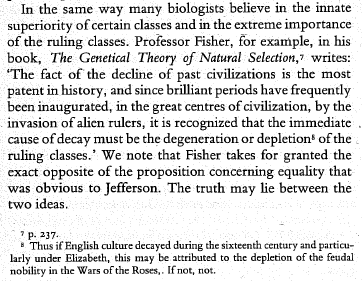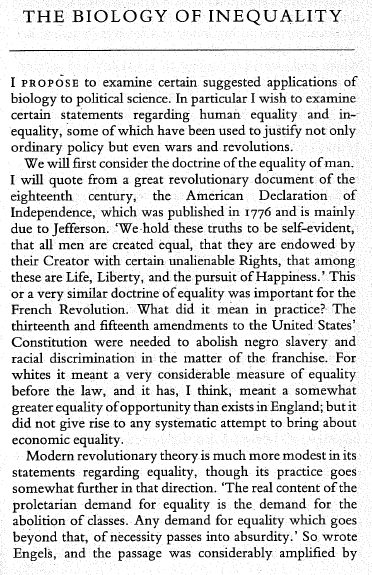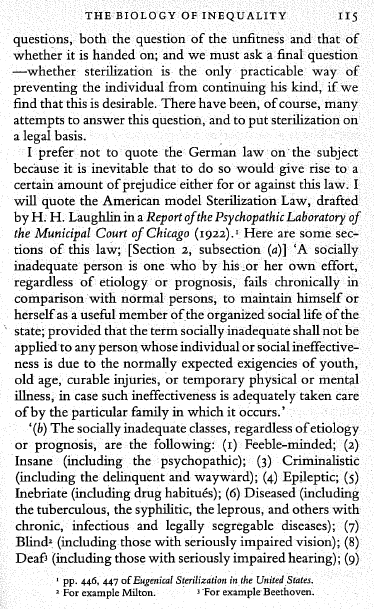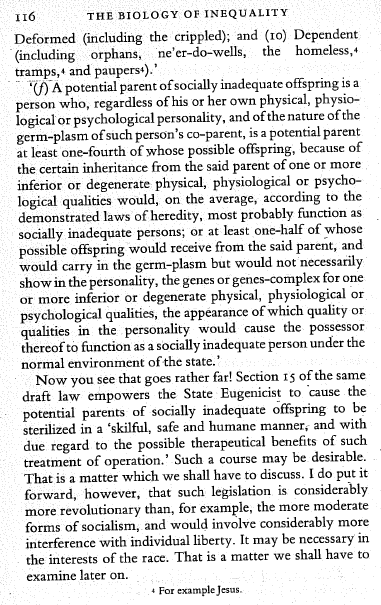Haldane (1938) on the Biology of Inequality

As noted in the post on the attempts to can T.H. Huxley, Imperial College is proposing to also dename rooms named for R. A. Fisher and J.B.S. Haldane. Fisher has been widely targeted since 2020 (in my view out all proportion with the actual evidence – I agree with Stephen Jay Gould (1991) on Fisher, but that is another post). But as a political conservative and eugenicist (although he basically stopped eugenics advocacy in the 1930s, unlike many others), and without a big obvious record of progressive actions, Fisher is a challenge to defend.
Targeting J.B.S. Haldane, of all people, is, well, nuts. Everyone seems to have forgotten that he was a vocal critic of the older eugenics, another reform eugenicist like Julian Huxley, but even further left. Haldane was a literal card-carrying communist and inveterate critic of the classist assumptions of the earlier eugenicists. His far-left views got him in trouble when it came to defending Stalin – Haldane probably was on a lot of lists for cancellation by the right in the 1950s. (Added in edit: Joe Felsenstein, in a post below, saw Haldane speak at the University of Wisconsin in 1963. He notes that Haldane was initially going to speak in North Carolina, but was was blocked by the North Carolina state legislature, and was apparently blocked from even visiting the USA for years before 1963.)
The New York Times review of the 2020 biography A Dominant Character: The Radical Science and Restless Politics of J. B. S. Haldane says, “British intelligence kept him under surveillance for more than 20 years on the suspicion — probably unfounded — that he was a Soviet spy.” Haldane’s slowness to criticize Lysenko didn’t make him any friends in the genetics community either.
Haldane was a remarkable individual and progressive in many ways, for example, as a critic of empire (specifically the Suez Crisis of 1956) he moved to India in his later years, something that the Imperial College tribunal tasked with reviewing colonialist legacies at Imperial somehow does not mention. But, I don’t have the bandwidth for a detailed defense of Haldane at the moment. But I can help in one way. For many moderns who make judgements based on what’s put in front of them online, preferably in a Twitter post, sources don’t really exist unless they are online, free, and text-searchable by Google. Haldane’s famous 1938 essay “The Biology of Inequality,” from his book Heredity and Politics, does not appear to be online. But I dare anyone to read these passages and then present an argument that Haldane is really someone who should be cancelled in the name of social justice.
Haldane’s essay begins with:
We will first consider the doctrine of the equality of man. I will quote from a great revolutionary document of the eighteenth century, the American Declaration of Independence, which was published in 1776 and is mainly due to Jeffersion. 'We hold these truths to be self-evident, that all men are created equal, that they are endowed by their Creator with certain unalienable Rights, that among these are Life, Liberty, and the pursuit of Happiness.'"
Haldane’s essays considers to proponents of the opposing view – inequality – taking each in turn. Be sure to read the footnotes.
Let us now consider a series of doctrines that are based on the theory of inequality. We will take first the theory that 'the unfit should be sterilized'. I may add at once that the operation of sterilization is not castration. It means an operative interference which prevents the conception or begetting of children. It is a slight operation in men, more serious in women. There have been many statements of this doctrine. For example, Mr Justice Holmes of the United States Supreme Court, in a judgment on appeal, said: 'It is better for all the world if society can prevent those who are manifestly unfit from continuing their kind.' We must ask, however, 'Who are the unfit?' and 'Do they all continue their kind?' We must also ask who is to decide these questions, both the question of the unfitness and that of whether it is handed on; and we must ask a final question -- whether sterilization is the only practicable way of preventing the individual from continuing his kind, if we find that is desirable. There have been, of course, mnay attempts to answer this question, and to put sterilization on a legal basis.
I prefer not to quote the German law on the subject because it is inevitable that to do so would give rise to a certain amount of prejudice either for or against this law. I will quote the American model Sterilization Law, drafted by H. H. Laughlin in a Report of the Psychopathic Laboratory of the Municipal Court of Chicago (1922).1
Here are some sections of this law; [Section 2, subsection (a)] 'A socially inadequate person is one who by his or her own effort, regardless of etiology or prognosis, fails chronically in comparison with normal persons, to maintain himself or herself as a useful member of the organized social life of the state; provided that the term socially inadequate shall not be applied to any person whose individual or social ineffectiveness is due to the normally expected exigencies of youth, old age, curable injuries, or temporary physical or mental illness, in case such ineffectiveness is adequately taken care of by the particular family in which it occurs.'
'(b) The socially inadequate classes, regardless of etiology or prognosis, are the following:[...]
- (1) Feeble-minded;
- (2) Insane (including the psychopathic);
- (3) Criminalistic (including the delinquent and wayward);
- (4) Epileptic;
- (5) Inebriate (included drug habitués);
- (6) Diseased (including the tuberculous, the syphilitic, the leprous, and others with chronic, infectious and legally segregable diseases);
- (7) Blind2 (including those with seriously impaired vision);
- (8) Deaf3 (including those with seriously impaired hearing);
- (9) Deformed (including the crippled); and
- (10) Dependent (including orphans, ne'ev-do-wells, the homeless,4 tramps,4 and paupers4).'
Now you see that goes rather far! [...] I do put it forward, however, that such legislation is considerably more revolutionary than, for example, the more moderate forms of socialism, and would involve considerably more interference with individual liberty.
1 pp. 446-447 of Eugenical Sterilization in the United States.
2 For example Milton.
3 For example Beethoven.
4 For example Jesus.
pp. 115-116 of: J.B.S. Haldane (1938). "The Biology of Inequality." pp. 113-134 of: On Being the Right Size and other essays, Edited by John Maynard Smith. Oxford: Oxford University Press, 1985. Originally published as Chapter 1 of Heredity and Politics. Derived from Haldane's Muirhead Lectures given at the University of Birmingham in February and March 1937.
Another passage:
The third statement which we shall have to consider is that certain classes are congenitally superior to others, and that it is desirable that the superior classes should reproduce more rapidly. As an example of that type of thinking I will quote the Report of the Committee of the Eugenics Society (1910)5, which commented on the Reports of the Royal Commission on the Poor Laws published in 1909. "That element in pauperism which represents and transmits original defect, almost completely neglected in the investigation and wholly neglected in the recommendations of the Commission, is the one we wish to take into consideration. The determination of this element is not a matter of opinion but of the application of methods of careful investigation. It is impossible to disregard the fact that the typical dependant who habitually received relief. Yet it is precisely the latter who is primarily the subject of Poor Law relief, and who affords the chief burden on the public purse. He is not the man who responds to a call on manly independence or stands ready to take a place made available through the Labour Exchange. He was born without manly independence6 and is unable to do a normal day's work however frequently it is offered to him.'
(ibid, p. 117)
5 Quoted by E. J. Lidbetter, Heredity and the Social Problem Group (1933), vol. I, p. 12.
6 In my own experience the majority of new-born infants are devoid of this quality.
Finally, he addresses R. A. Fisher’s (1930) book The Genetical Theory of Natural Selection. I mention in passing that, although Fisher was a conservative and Haldane was a communist, Fisher helped Haldane out in 1940, during the London Blitz of World War 2, by inviting Haldane to share his lab space out of the city. They did fall out later, during the Cold War, over Haldane’s gentle treatment of Lysenkoism.
It is only fair to remember that was written in 1910, and that since then the problem of unemployment has entirely changed in character. Those people who were regarded as unemployable have been called the 'social problem group' by the investigators of the Eugenics Society. Modern sociologists, however, rarely ascribe the unemployment of 1 1/2 million people to congential abnormalities. We shall later discuss the theory that many of the poor are poor because of hereditary defects.
In the same way many biologists believe in the innate superiority of certain classes and in the extreme importance of the ruling classes. Professor Fisher, for example, in his book, The Genetical Theory of Natural Selection,7 writes:
'The fact of the decline of past civilizations is the most patent in history, and since brilliant periods have frequently been inaugurated, in the great centres of civilization, by the invasion of alien rulers, it is recognized that the immediate cause of decay must be the degeneration or depletion8 of the ruling classes.'
We note that Fisher takes for granted the exact opposite of the proposition concerning equality that was obvious to Jefferson. The truth may lie between the two ideas.
7 p. 237.
8 Thus if English culture decayed during the sixteenth century and particularly under Elizabeth, this may be attributed to the depletion of the feudal nobility in the Wars of the Roses. If not, not.
(ibid, p. 118)
I note that Fisher, according to Haldane a critic of the Jeffersonian ideal; Haldane, critic of Fisher’s criticism; and Jefferson himself, have now all been canned, all for violating Jefferson’s proposition concerning equality.
References
J.B.S. Haldane (1938). “The Biology of Inequality.” pp. 113-134 of: On Being the Right Size and other essays, Edited by John Maynard Smith. Oxford: Oxford University Press, 1985. Originally published as Chapter 1 of Heredity and Politics. Derived from Haldane’s Muirhead Lectures given at the University of Birmingham in February and March 1937.
Related Links
Jerry Coyne has a good blogpost on Haldane at: https://whyevolutionistrue.com/2020/08/15/the-colorful-and-erudite-j-b-s-haldane-my-take-and-a-new-biography/
Coyne on the Imperial College situation: https://whyevolutionistrue.com/2021/10/27/t-h-huxley-about-to-be-cancelled-at-imperial-college-london/
Images of Haldane 1938 excerpts




Addendum: Haldane story from Joseph Felsenstein
2021-11-09 update: I am adding in this story that Joe Felsenstein posted in the comments. Because comments are in a different system (Disqus) they can get lost, and this might as well be preserved for posterity:
Joe Felsenstein, Moderator • 4 days ago • edited
I should just mention that I am possibly the only person reading this post who actually got to see JBS Haldane. In the fall of 1963 he visited the U.S., after years of being prevented from doing so. He was to give a lecture in North Carolina, but the state legislature prevented it. The University of Wisconsin invited him. I was an undergraduate student in James Crow's lab; I got to hear his lecture to a large audience. He talked about mutation, and made it clear that he was following closely the progress of working out the genetic code, which was happening then. I also heard him talk to a smaller audience of about 30 people, one of whom was Sewall Wright. We students of population genetics were looking forward to hearing them say important things. They were quite polite to each other but Haldane was concentrating on making the worst puns possible, while Wright, as usual, mumbled to anyone who would listen about this or that paper he had written. I listened also to Haldane speak with admirers at a reception (again, mostly bad puns). There is a wonderful new biography of Haldane, A Dominant Character, by Samanth Subramanian. I described his bad pun at the reception to Subramanian, who included it. If anyone were tempted to accuse Haldane of racism, they should deal with the fact that he was fascinated by India since recuperating there from wounds in World War I, and in the 1950s he emigrated there and identified himself as an Indian. He also declared that this was owing to his disgust at the French/British/Israeli seizure of the Suez Canal in 1956, but he had been planning the move before that.
(Felsenstein comment on Nov. 5, 2021)
